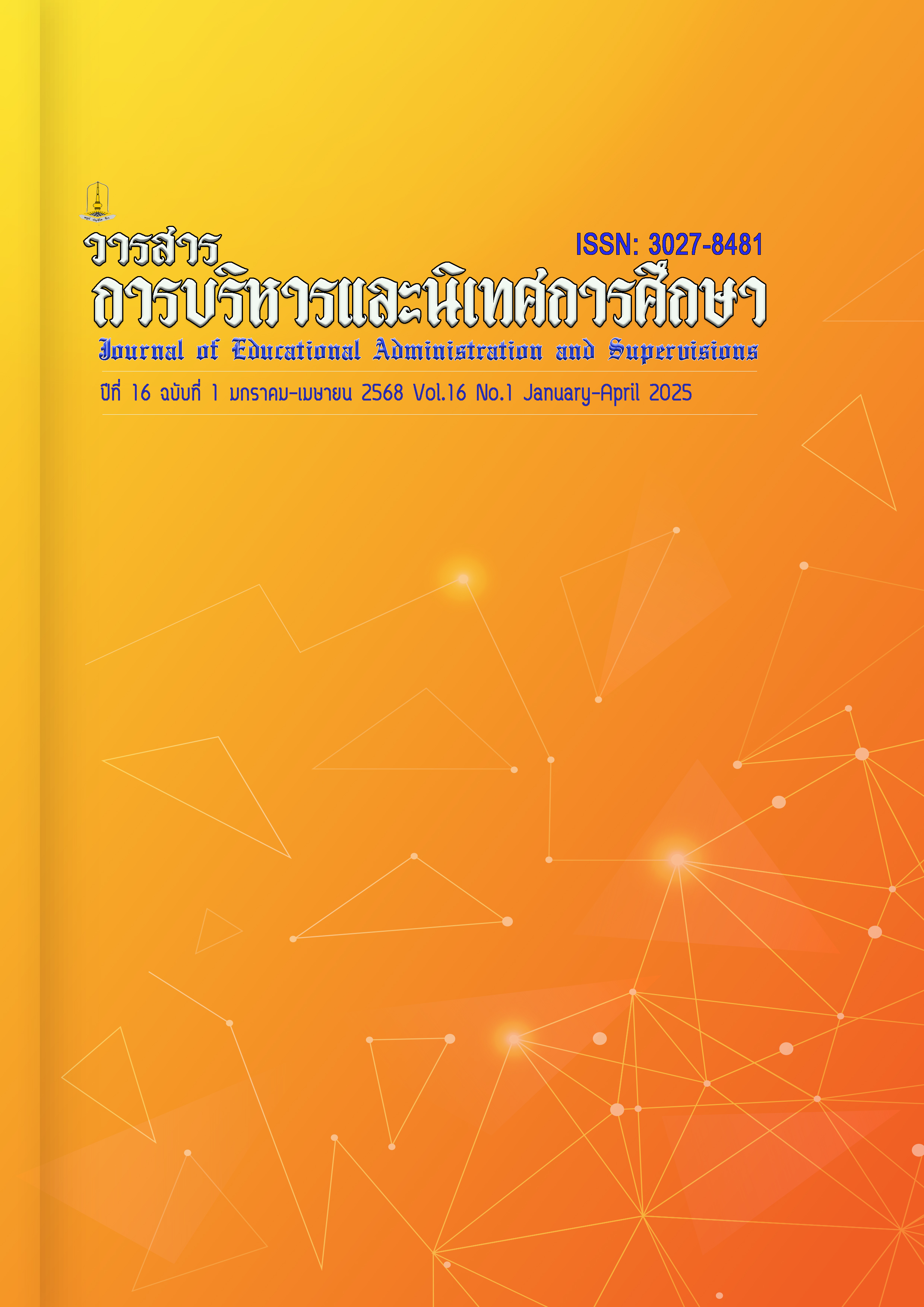The Relationship between Leadership Based on Path – Goal Theory and Academic Administration of Educational Institutions under the Office Of Education Bangkok Metropolitan Administration
Main Article Content
Abstract
The objectives of this research were 1) to study leadership according to the path-goal theory of educational administrators according to the views of teachers in Bangkok. 2) To study academic administration of educational administrators according to the views of teachers in Bangkok. 3) To study the relationship between leadership according to the path-goal theory and academic administration of educational administrators in educational institutions according to the views of teachers in Bangkok. The sample group used in this research was teachers in Bangkok in the academic year 2024. Cohen's ready-made table was used to determine the sample group at a statistical significance level of .05, resulting in a sample of 370 people. Multi-stage random sampling was then used. The instrument used was a 5-level rating scale on leadership according to the path-goal theory of educational administrators, divided into 4 dimensions: 1) directive leadership, 5 items; 2) supportive leadership, 5 items; 3) participative leadership, 5 items; 4) achievement-oriented leadership, 5 items; and academic administration of educational administrators, divided into 4 areas:
1) educational institution curriculum management, 7 items, 2) learning process management, 6 items, 3) measurement and evaluation of learning outcomes, 6 items, 4) development of innovative media, technology and learning resources, 5 items, the consistency index was between 0.6 – 1.0, the discrimination power was between 0.276 – 0.797, and the reliability was 0.95. The statistics used for data analysis were percentage, mean, standard deviation, and Pearson's product moment correlation coefficient.
The results of the research revealed that: 1) the leadership according to the path-goal theory of school administrators under Bangkok Metropolitan Administration was at a high level overall and in each aspect. (x ̅ = 4.18) 2) The level of academic administration in educational institutions under Bangkok Metropolitan Administration was at a high level overall and in each aspect. (x ̅ = 4.42) 3) The relationship between leadership according to the path - goal theory and academic administration in educational institutions was positively (r = 748), with statistical significance at the .01 level.
Downloads
Article Details

This work is licensed under a Creative Commons Attribution-NonCommercial-NoDerivatives 4.0 International License.
References
ชูศรี วงศ์รัตนะ. (2562). เทคนิคการใช้สถิติเพื่อการวิจัย (พิมพ์ครั้งที่ 14). อมรการพิมพ์.
ธีร์ธนพัชร ร้อยดาพันธุ์. (2565). ความสัมพันธ์ระหว่างภาวะผู้นำทางวิชาการของผู้บริหารสถานศึกษากับประสิทธิผลการบริหารงานวิชาการของโรงเรียนประถมศึกษาในสังกัด สำนักงานเขตพื้นที่การศึกษาประถมศึกษาสกลนคร เขต 1 [วิทยานิพนธ์ปริญญามหาบัณฑิต ไม่ได้ตีพิมพ์]. มหาวิทยาลัยราชภัฎสกลนคร.
นถมล จิตรเอื้อ, เฉลิมชัย กิตติศักดิ์นาวิน และนลินณัฐ ดีสวัสดิ์ (2560). บทบาทภาวะผู้นำในการพัฒนาองค์การสู่องค์การแห่งการเรียนรู้. Veridian E-Journal,Silpakorn University ฉบับภาษาไทย สาขามนุษยศาสตร์ สังคมศาสตร์ และศิลปะ, 10(2), 1738-1754. https://he02.tci -thaijo.org/
index.php/ Veridian-E-Journal/article/view/100347
หน่วยศึกษานิเทศก์ สำนักการศึกษา กรุงเทพมหานคร. (2566). แนวทางการบริหารจัดการคุณภาพโรงเรียนสังกัดกรุงเทพมหานคร การบริหารวิชาการ.กรุงเทพมหานคร.
บุญชม ศรีสะอาด (2560). การวิจัยเบื้องต้น (พิมพ์ครั้งที่ 10). สุวิริสาสน์.
บุสตามัน กามะ. (2564). ภาวะผู้นำตามทฤษฎีวิถีทาง-เป้าหมายของผู้บริหารสถานศึกษากับแรงจูงใจในการปฏิบัติงานของครูสังกัดอาชีวศึกษาสามจังหวัดชายแดนภาคใต้ [วิทยานิพนธ์ปริญญามหาบัณฑิต ไม่ได้ตีพิมพ์]. มหาวิทยาลัยราชภัฏยะลา.
พิมลพรรณ เพชรสมบัติ. (2560). ทักษะการบริหารของผู้บริหารมหาวิทยาลัยเทคโนโลยีราชมงคลธัญบุรี จังหวัดปทุมธานี ภาคใต้ [วิทยานิพนธ์ปริญญามหาบัณฑิต ไม่ได้ตีพิมพ์]. มหาวิทยาลัยเทคโนโลยีราชมงคลธัญบุรี.
ภาวิตา ฮั่นสกุล. (2561). ความสัมพันธ์ของภาวะผู้นำตามทฤษฎีวิถีทาง – เป้าหมายกับการบริหารงานวิชาการของผู้บริหารสถานศึกษา สังกัดสำนักงานเขตพื้นที่การศึกษามัธยมศึกษา เขต 5 จังหวัดนนทบุรี [วิทยานิพนธ์ปริญญามหาบัณฑิต ไม่ได้ตีพิมพ์]. มหาวิทยาลัยธุรกิจบัณฑิตย์.
ราชกิจจานุเบกษา. (2560, 6 เมษายน). รัฐธรรมนูญแห่งราชอาณาจักรไทย พุทธศักราช 2560. เล่ม 134 ตอน 40 ก.
เริงฤทธิ์ คำหมู่. (2565). ภาวะผู้นำทางวิชาการของผู้บริหารสถานศึกษาที่ส่งผลต่อประสิทธิผลการบริหารงานวิชาการในสถานศึกษา สังกัดสำนักงานเขตพื้นที่การศึกษาประถมศึกษาเลย เขต 3 [วิทยานิพนธ์ปริญญามหาบัณฑิต ไม่ได้ตีพิมพ์]. มหาวิทยาลัยนเรศวร.
วินนา พลชำนิ และสุกัญญา สุดารารัตน์ (2565). ภาวะผู้นำวิถีทางเป้าหมายของผู้บริหารสถานศึกษาสังกัด สำนักงานเขตพื้นที่การศึกษามัธยมศึกษานนทบุรี. วารสาร มจร อุบลปริทรรศน์, 8(2),463-474. https://so06.tci-thaijo.org/index.php/mcjou/article/view/267090
สำนักการศึกษา กรุงเทพมหานคร. (2566). รายงานสถิติการศึกษา ปีการศึกษา 2566 โรงเรียนสังกัดกรุงเทพมหานคร. กรุงเทพมหานคร.
กระทรวงศึกษาธิการ. (2542). พระราชบัญญัติการศึกษาแห่งชาติ พ.ศ. 2542. สำนักพิมพ์กระทรวงศึกษาธิการ.
สำนักงานเลขาธิการสภาการศึกษา. (2564). ยุทธศาสตร์ชาติ 20 ปี: ด้านการพัฒนาและเสริมสร้างศักยภาพทรัพยากรมนุษย์. สำนักงานเลขาธิการสภาการศึกษา.
Cohen, L., Manion, L., & Morrison, K. (2018). Research methods in education (8th ed.).Routledge.
House, R. J., & Dessler, G. (1974). The path-goal theory of leadership: Some post hoc and a priori tests. In J. G. Hunt & L. L. Larson (Eds.), Contingency approaches to leadership. Southern Illinois University Press.
Likert, R. (1967). The human organization: Its management and value. McGraw-Hill.


